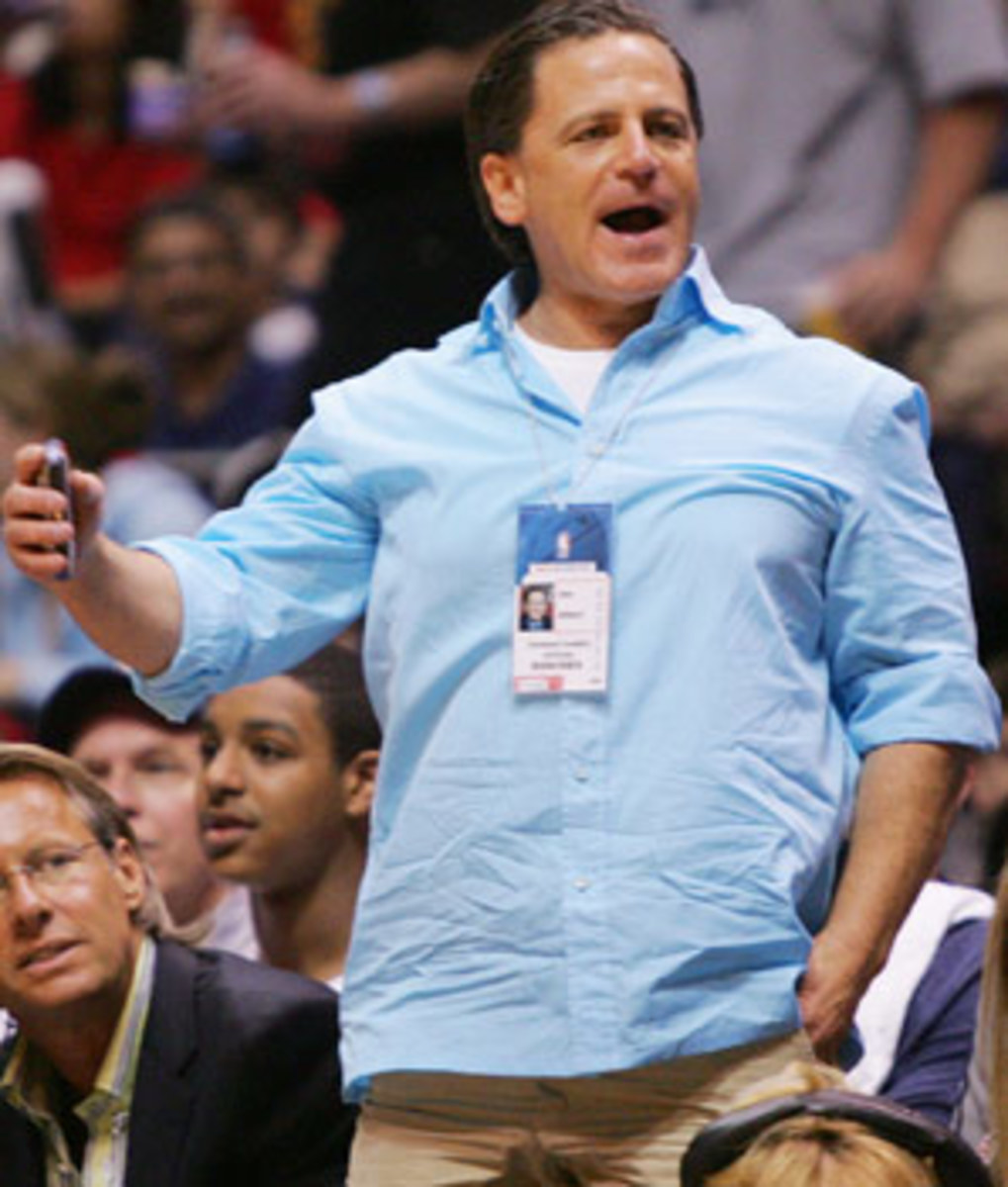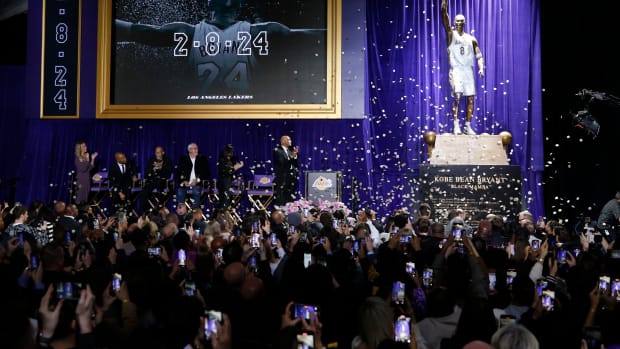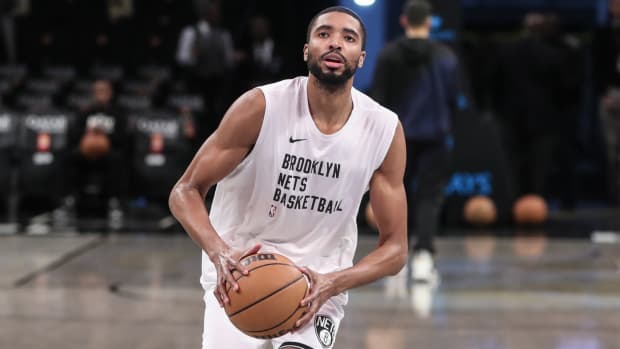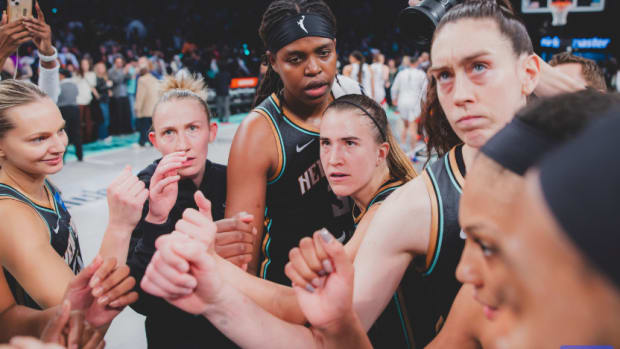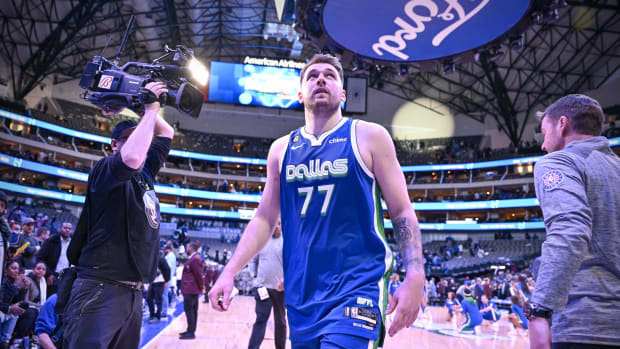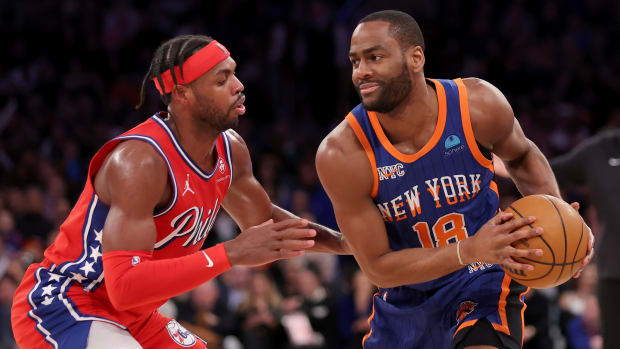Dan Gilbert unplugged: what makes the mercurial Cavs owner tick
The font is cast on Dan Gilbert. His image is strapped to his own words, the ones blasted out two years ago in a fit of howling rage. Those 411 words in an infamous letter were meant to soothe the latest wounds of a beleaguered city's sports fans in the wake of bitter betrayal, but they have defining permanence for the billionaire owner of the Cleveland Cavaliers. They were lint on his fine suits for two years. Last spring, they became miniature Frankensteins broken from chains, free to stalk once LeBron James clutched the NBA championship trophy promised by his former boss.
Gilbert accepts being dogged by his own words without regret, even if they highlight only the petulance of a man possessing as many layers as his vast business empire. He's a gut man, feels something, goes with it, says it. His personal highway is always wide open, speed limit be damned. There is no use in pausing to deconstruct words. Words are static. So, too, is the sports gloom in northeast Ohio, which watched its native son -- James, who memorably turned his back on home in a self-aggrandizing spectacle -- win a championship. Cleveland hasn't enjoyed a title in 48 years, not since the city's NBA owner was two years old. Lamenting the past is like watching concrete dry to Gilbert. What's done is done.
Gilbert is looking forward, his mind churning like a hummingbird's wings. Good for James, he won his title and an Olympic gold medal, and was named Sports Illustrated's Sportsman of the Year. Cleveland is still trying to dig out of the rubble caused by his departure. The Cavaliers are 5-20, buried in last place in the East Conference's Central Division. Wallowing in woe doesn't cut it. Work lies ahead. Gilbert can't dwell on "the player who left" as he refers to James. He must build, always build. He's been pushing since he was a child, back when he drove his teachers nuts, always asking why, thinking new thoughts, challenging norms. Clocks don't stop for creators. Besides, there is more to tend to than basketball. The Cavaliers are just one of his 40-plus companies, all spawned from his mortgage behemoth, Quicken Loans. The businesses are meshed together in spirit, moving in mass against the persistent economic malaise that tempts his hometown of Detroit and his adopted Ohio sister-city with the self-pity permeating the Cleveland sports scene. Chasing a holy grail NBA title is only one thread of an effort to change Rust Belt mentality.\n
"Dan is a catalyst to get people to think beyond the existing world and their existing walls," says Cavaliers president Len Komoroski. "He's about, 'What if? What is possible?' "
Gilbert is Jeapordy! come to life, always asking questions. If he's not firing queries, his proclamations often end with the phrase, "right?" The tic is his inner-salesman seeking a nod to his optimism. He's always fishing for knowledge, asking, wondering, and dreaming like a child under a bedroom poster of his favorite player. He mixes his companies like a chemist, opens his checkbook with an explorer's passion. Gilbert has done so since buying the Cavaliers for $375 million in 2005. When James was with the team, Gilbert invested $160 million in free agents, more than $40 million in improvements to Quicken Loans Arena and another $25 million on a new practice facility in a futile attempt to not only win a title, but also keep James home.
The splurge was part of a larger business plan to spur growth where others turn from blight. His investments in and around Cleveland are estimated at a total close to $1 billion. Gilbert now owns the Canton Charge of the NBA Development League, the Lake Erie Monsters of the American Hockey League and Thistledown thoroughbred track near James' hometown of Akron. His latest business thread is The Horseshoe Casino Cleveland, which he nurtured to life on a state ballot and built near his NBA arena. Back in his hometown, he's pushing his vision of "Detroit 2.0" by nurturing startup businesses to build a vibrant downtown core in the form of a technology district. In the past two years, Gilbert has splurged on purchasing and renovating old buildings. He now owns nearly 2 million square feet of real estate in Detroit, second only to General Motors. He's renting office space to entrepreneurs, fellow believers in pushing past the stagnancy of mere words.
"Detroit is a town that's been beaten up, down in the dumps, but has this certain spirit about it," Gilbert says. "Cleveland does, too. It never gives up. 'We're going to keep coming at it.' I want to be part of that. I want to be in position to affect the outcome."
There is money to be made, of course. Cynics don't cast his pursuit in the same noble terms as Gilbert. He puts his business beliefs -- You'll see it when you believe it! -- in a colorful book given to all employees. Those "isms," as he calls them, don't fit stereotypical corporate culture, especially in the stodgy world of traditional sports ownership. Good ideas can come from anywhere, the intern making copies, the bum in the alley. All phone calls and e-mails must be returned, no excuses.
"You must be close to your business," Gilbert says. "You must be in the bowels of your business, not in some ivory tower looking at pie charts. Being close to the fans and understanding their wants, beliefs and needs is important to the business." Fans know best. So he mingles with them, talks, listens, tweets them and, yes, writes a public letter when necessary. The Decision begot The Letter. He writes it from his gut, exactly where they all feel kicked. He makes bold, incendiary statements that fit the perceived oversized injustice. Volume cranked to 11, he puts the rallying call out there in comic sans, a font he began using on interoffice e-mails eight years ago just to be different.
"For some reason, they really use that as the lens that they see everything through -- a comic sans letter that was written about a basketball player," Gilbert says. "I knew it was unusual and emotional, but it shocks me how much legs it had on a national scale."
Locally, the Gilbert letter was celebrated like a Gettsyburg Address of heartfelt righteous indignation. Nationally, it was lampooned. Blowback increased the next day when the outraged owner further vilified James by accusing the league MVP of quitting on the Cavaliers during their second-round playoff series loss to Boston. The Rev. Jesse Jackson responded that Gilbert saw James as a "runaway slave." Gilbert hired a Cleveland law firm to investigate the possibility of tampering by the Heat before the free agency period had begun (nothing came of it). Squawking heads on TV were in a frenzy. NBA commissioner David Stern had to take down the circus tent. Four days after the comic sans eruption, the NBA fined Gilbert $100,000 for "inappropriate comments about James."
"I don't think Dan was necessarily out of control that time," Stern says. "I think, in some ways, he was talking to a different audience than I was concerned about. I was concerned about the league as a whole as audience. He was expressing, in his own forceful way, the sentiments of Ohio. There are not a lot of layers between Dan and what he thinks of as the truth."
Zealotry opened his wallet. Gilbert committed to pay more than $100 million in salary and NBA luxury taxes, more than the Knicks and Lakers, in James' last season in Cleveland. Seven of the team's players earned at least $8 million that year, during which the Cavs won a franchise-record 66 regular-season games but crashed into a second-round playoff loss to Boston. "We felt we did everything that was right for the franchise, to put the franchise in the best position for winning, to create a winning environment," Gilbert says.
James wanted a championship and felt his best chance was to win one in Miami. He told the world before he told the Cavs.
"Dan didn't like the fact that LeBron was taking the easy route in a fancy, warm-weather city with more superficial people who are less grounded than the people in Cleveland," says Quicken Loans vice president David Carroll, who has known Gilbert since they were both four. "But the aspect that bothered him most was the lack of personal communication, the basic courtesy not shown by not giving Dan a phone call or telling him the decision first in person before going on TV. He was never able to build up a relationship with LeBron, and that bothered him. It frustrated Dan."
Frustration, of course, burst forth in font. The cannon was readied when James went on ESPN. Carroll knew as soon as he watched the national broadcast of the decision by the league's MVP to leave for Miami that some type of e-mail or declaration would soar across the sky. Now the fun starts, he muttered to himself.
"I felt like I needed to get this out," Gilbert says. "People needed to understand."
*****
Caricature doesn't only come from font. Gilbert appears to have no neck, his head pushed down onto his barrel chest, thickened by years of power weightlifting. His closest friends call him "Sponge," short for SpongeBob SquarePants. The square has edginess. When Gilbert purchased the Cavs in 2005, the new owner kicked the franchise into overdrive, the only gear he knows once a cause is determined to be worth his blood. No one has ever accused the energetic 5-foot-5 bundle of dabbling. If he's in, he's all in. His lone dive is a cannonball.
Charging the familiar castle gates has enriched Gilbert, ranked 250th on the 2012 Forbes 400 list with a net worth of $1.9 billion. Rewards have come from risks. His tendency to scribble outside the lines belies his hometown, where the streets were built with rectilinear planning. Gilbert earned a law degree at Wayne State after majoring in journalism at Michigan State, but always had the imagination of an artist. What if? His dynamic ideas are sometimes met with stares. Creativity is sometimes crazy, right? Van Gogh sliced off his own ear. Gilbert's knife is the keyboard, which he sometimes hits with an attitude that Stern describes as "ready, fire, aim." Long before rising to comic sans fame, he was known to occasionally launch heat-seeking e-mails or bombastic letters. Carroll recently talked him out of firing back at a Detroit blogger who had the gall to describe the interior design of the company's new downtown offices as "a collaboration between Willy Wonka and a tech nerd."
Loyalty is a word tattooed in cursive script running up James' left rib cage, but it's ingrained in Gilbert's DNA. His grandfather and father were both born and raised in Detroit, where he still lives just outside the city with his wife of 18 years, Jennifer, and their five children. Home is worth fighting for. Gilbert detests the flyover states label draped on the Midwest by national writers and broadcasters, some of whom he refers to as "media spectacle characters."
This issue began pushing his pride button in 2007 as soon as James signed a three-year deal with a player option for a fourth instead of the five-year deal offered by the Cavs. The franchise's win-it-all mentality sped up, wrecking all salary cap space with moves such as Gilbert paying $21 million to acquire moon-sized Shaquille O'Neal for one season. Even faster was the drumbeat of outside predictions that James would opt for free agency if he couldn't lead Cleveland to a title by his seventh NBA season. So what if the team drafted him out of high school, 40 miles down the road, and showered one of their own with adulation? Scores of corporations, athletes and everyday people had been fleeing the lakefront for years, leaving what was once the nation's seventh largest city, now ranked 43rd. Cleveland's population shrank 17 percent, below 400,000 for the first time in a century, between 2000 and 2010. Everybody leaves. Nike's biggest and brightest icon would certainly do the same, right?
"There was just this march," Gilbert says, "that was almost assumed by some of these guys on ESPN, that it's just a matter he's going to New York or Chicago or LA because why would somebody like him want to be in the middle part of the country? That part of it was really sort of an insult to the Midwest people. Only people from the Midwest understand how offensive that was. Why wouldn't he want to play here?"
A fuse had been lit. "I'm sure I'm not the coolest head in the world," Gilbert says. His comic sans diatribe on the team's website immediately after The Decision wasn't unique. Other business relationships had ended in less than ideal fashion. In 2007, he fired David Hall, senior vice president of Rock Financial, part of the Quicken Loans family. Two years later, the two men reportedly got into a screaming, physical altercation at a bar mitzvah at a posh suburban Detroit hotel. Police looked into the matter, but charges weren't filed. A less public outburst occurred five years ago when Comerica Inc., a financial service company with assets of $58 billion, announced it was moving the company's headquarters from Detroit to Dallas. The bank's CEO happened to be a Texas native. Gilbert responded by pulling all of Quicken Loans' accounts from Comerica and transferring them to another bank.
Clevelanders are accustomed to being browbeaten as a national punch line, their city mocked in song, their teams perpetual exploding cigars. Gilbert is a local lifeboat in a sea of negativity. He's a fellow Midwesterner defending the region, boasting about its virtues, spending money on making the town and teams better. He went to school in his home state, married his college sweetheart, never moved away. "I'm sort of like a farmer in the sense that I've always stayed at home," Gilbert says.
He's a billionaire with blue-collar tastes. He rose up from middle-class roots and now desires to pull up the region, moving jobs downtown, doing well by doing good. So while others crack wise about the so-called Mistake on the Lake, Gilbert pushes the NBA to bring its all-star game back to Cleveland for the first time since 1997. He shot a late-night e-mail to Stern last December that said it would be a travesty for the league's competitive balance if the commissioner allowed the Los Angeles Lakers to acquire Chris Paul. "When will we just change the names of 25 of the 30 teams to the Washington Generals?" Gilbert asks in the email that was leaked to the media.
*****
Detroit's demise is sold in coffee table books known as "ruin porn." They offer pages and pages of photos depicting abandoned homes, schools, churches and manufacturing plants. The city now has enough vacant land to fit all of San Francisco. One of those empty lots is at Seven Mile and Woodward Ave., about six miles north of downtown. Gilbert's muse swirls there, where his father once owned and ran a bar, a narrow joint with a rectangular restaurant. Food was modest, except for the glorious shrimp cocktail. Prostitutes and shady characters roamed outside, but dreams flourished inside. Conversations never stopped. The working class that once built Detroit into the nation's fourth largest city of 1.85 million in the 1950s discussed the city's decline, their despair wafting in the smoldering ruins of the '67 race riot. They'd talk of a better place, the need to try new things. Young Dan listened and learned. His value of hard work came from watching his father toil long hours, same as his grandfather did at the car wash he owned in town. In some ways, Gilbert has never really left that bar, where he'd mess around with the calculators and adding machines in the basement.
A bar's open atmosphere exists in the Cavaliers and throughout all of Gilbert's companies. He's known to walk around the office asking anyone what they think about anything. Topics know no boundaries. Can you name the 10 body parts that start with the same letter? People are connected, and not just by conversation. Irreverence rules. Gilbert has sprayed employees with a squirt gun at a formal company dinner. He often begins meetings with silly videos made by a full-time film guy stationed near his desk. He once hired his high school band to go into the office and play Happy Birthday for one longtime friend. "We're like the anti-corporate, anti-bureaucratic company," Gilbert says. The rebellious and free-thinking culture has created a bond, evident in Fortune magazine naming Quicken Loans as one of the top 10 best companies to work for in 2012. Some of his employees have been with him since he depleted his savings to start Quicken Loans, then known as Rock Financial, in 1985. All are encouraged to think, share, shake up traditional thinking.
Barriers began falling at a young age. When other kids were rifling through sports magazines, Gilbert read Barron's. He sold yo-yos, bagels, pots and pans. He'd bought candy at the local drugstore and resold it from a display in the family garage, half the proceeds going to the annual Jerry Lewis telethon for muscular dystrophy. At age 12, he bought Chef Boyardee pizza mix, made the pies in mom's kitchen, and advertised them for sale with fliers in neighbors' mailboxes. His little brother delivered the pizzas on his bike until the health department caught wind of it and shut down the operation. The unorthodox hustler thrived in the neighborhood's sense of community pride only to see such spirit fade throughout the Motor City as jobs drained over the years and families fled. Detroit lost 600,000 residents between 1950 and 1980s. Today, its total population of 713,000 ranks 18th in the nation, with more than 25 percent gone in the past decade. But the man who never left smells opportunity for his hometown's rebirth even though the city faces a $265 million budget deficit and gave the state of Michigan oversight powers in April.
Gilbert has sought to bring jobs back to the Rust Belt. In 2010, his Quicken Loans office and its 1,700 employees moved from the suburb of Livonia to downtown Detroit. Gilbert's family of companies now have 5,400 full-time workers in the city. He's created Bizdom U, a nonprofit academy that trains and mentors startup companies by offering financing packages if they base their enterprises in Detroit (and done the same in Cleveland). He's blowing the horn for others to fill the technological corridor he envisions in the downtown real estate that he's spent more than $100 million on. Small startup companies are moving in. So are big names. Chrysler and Twitter recently moved employees into Gilbert's buildings. Of course, James cost Gilbert money by heading to Miami. He filled Quicken Loans Arena with more than 20,000 people a night, which happens to be the same number that Gilbert is now counting on to visit his new downtown Cleveland casino. Income alone, however, doesn't measure the emotional impact James' departure had on Gilbert. Taking his talents to South Beach struck against the owner's core beliefs, same as a bank leaving Detroit for Dallas.
"I think there's some validity to that, right?" Gilbert says. "Look, I'm a Midwest guy. I'm basically married to two cities, Detroit and Cleveland. I believe in these cities. I believe they can come back bigger and better than they've ever been and I would like other talented people -- whether they're in sports or in business -- to believe the same. That was our pitch to him. We said, 'Look, most likely you're going to win a title wherever you go, but the value of that title will mean a lot more to Cleveland than it will in another potential city because, a) it's your hometown, and b) because the city hasn't had a title in so long that even nationally it'll make you stand out.' Is it a failure on him or a failure on us to not be able to get him to see that? I don't know."
*****
What's the deal with the kid in the bow tie and thick glasses? He just keeps smiling. Doesn't he know the world is a hard, angry place? His body's betrayal should tell him so. Nick Gilbert was born with Neurofibromatosis (NF), a nerve disorder that causes tumors to grow anywhere in the body. Only one in 3,000 children have the disorder. One was born to Jennifer and Dan Gilbert. They had been married three years when their 15-month-old son was diagnosed with NF. His father, Mr. All-In, hunted down experts with a bounty hunter's zeal. We're going to beat this, right? He's donated so much money to a research center in Washington, D.C. that it's now known as the Gilbert Neurofibromatosis Institute. His son has endured hardship far eclipsing the lack of a sports championship.
Nick lost the vision in his right eye at age six. Four years later, he underwent brain surgery. There have been rounds of chemotherapy and enough hospitalizations to lose count. Now he's a cheerful teenager. Nick represented the Cavs at the past two NBA lotteries, his appearances helping to raises thousands of dollars for the Tumor Foundation through donations on Facebook and Twitter. He also brought luck in 2011 when the Cavs won the No. 1 overall pick, which they used to select Kyrie Irving, the league's rookie of the year last season. "What's not to like?" Nick asked on national TV before the ping-pong balls bounced Cleveland's way. The team suddenly had a bright marketing slogan for a region used to overcast skies.
"He's my hero," Gilbert says. "Here's this 15-year-old who has had chemotherapy four or five times, brain surgery, all this other stuff, and yet he's one of the happiest guys I know. He never complains about anything. He never says why me? He's so positive, it really is amazing."
Positive doesn't sell easily in Cleveland. Gilbert knows no other way, best exemplified by his determination to have commercial casinos in Ohio. State voters had defeated a casino measure four times in 18 years, including 2006 and 2008. Gilbert built a team of politicians, business leaders and community representatives. He sketched plans on a whiteboard. He joined with a casino company to spend $35 million on a campaign. In November 2009, Ohio voters passed Issue 3, which amended the state constitution to allow casinos to be built in four cities. No other region in the state had a higher percentage of affirmative votes than Cleveland. Gilbert next slalomed through the red tape of fees, questions and construction costs, all the while trumpeting how the $350 million casino would integrate with the downtown urban core, creating spillover business for nearby bars, hotels and restaurants.
"He's not greedy," Cleveland mayor Frank Jackson says. "He doesn't gouge. He actually contributes to the financial vitality of the city. He's a good corporate citizen. His investments are designed to promote and grow other things."
Growing means moving forward, but too often Cleveland is busy rehashing The Drive, The Fumble, The Shot, The Decision. Yet a hint of optimism could be detected downtown on May 14. On that spring night, the big spender who has been pushing against the town's negativity for seven years, stood inside a former department store now renovated with slot machines and gaming tables. He wore a dark tailored suit, gold Horseshoe pin on his lapel, name tag reading, "DAN." Outside, more than 4,000 people had lined up to enter The Horseshoe Casino on opening night. Ohio Gov. John Kasich wasn't among them. He skipped the opening ceremonies after voting against the casino measure, which passed 53 percent to 47 percent. Gambling has too many questions for consensus.
The overriding generalization of Gilbert in Cleveland is that he will do whatever it takes to win a championship. His methods are sometimes questioned, but not his desire. He gained popularity after buying the Cavaliers by declaring "they will be staying put in downtown Cleveland, right where they belong," to squelch rumors that he intended to move the franchise. He made good on the promise by sprucing up facilities. While he certainly became richer by inheriting a once-in-a-lifetime player, he didn't hesitate to spend millions on and around James. When the anointed savior left in such melodramatic fashion, the betrayal felt by an entire region was captured in a letter equally ridiculous. Fans and owner were already considered united in purpose. The letter confirmed their bond, which is why Gilbert has no regrets writing it. People in Cleveland still come up and thank him for his comic sans reaction. He has three binders stuffed with letters and e-mail printouts of fan support.
"There are thousands of them," Gilbert says. "They're handwritten by 92-year-old women, by chief cardiac surgeons, by policemen, by military guys. It's unbelievable. My letter wasn't even written to LeBron. It was written to the fans. It was written to the team's supporters. It was written to Cleveland, not the player. I had no idea when I was writing it, but it went beyond LeBron. It was about Cleveland, about loyalty, about their city, their relationship with their kids. It was such a seminal moment for people. Even to me it was shocking, because that was not necessarily the intent. It just struck some kind of major chord in this town. It also struck people on a personal level. "
The letter came back at him in June like a vengeful boomerang as James won his championship with the Miami Heat. A snark attack of Twitter jokes flew at Gilbert about him being on suicide watch. Someone rewrote his letter for comic effect. Get over it Cleveland. James obviously made the right decision in leaving, right? Gilbert tweeted congratulations to both teams while not mentioning James by name, just as he's called him "that player" in public and worse in private the past two years. Pettiness seems entrenched.
"Look, there was no friction between he and I," Gilbert says. "We always got along. There were never words. There was nothing bad, there really wasn't. Even he said in his comments it's not personal. I always sort of liked him. Is it personal or not? Only because I feel personally connected to Cleveland and Detroit. I know it wasn't personal. His decision wasn't about a personal feeling about Dan Gilbert. But it just became so personal because there are those of us who believe in Cleveland and Detroit. That's where it was personal."
James is validated. He finally has the championship long expected of him. He was magnificent in the playoffs, putting up numbers few had ever compiled, becoming a finisher instead of bejeweled assistant. He got what he wanted most in Miami, with Akron's 330 area code tattooed on his right forearm. Has he really left northeast Ohio for good? Deep down, does home mean the same to him as Gilbert? James recently told Oprah Winfrey that Gilbert's letter was "hurtful," but he hinted during the season about someday returning to play for the Cavaliers again. Would the man who runs open companies be open to the idea?
"Dan would take him back," Carroll says. "Dan is not going to go out of his way to recruit him. Who knows? Dan likes cool stories and happy endings. It could be a good thing for both of them, bring some closure. I think it would be great. Wouldn't that be pretty cool?"
Gilbert is coy on the topic, saying "nothing surprises me about the NBA." He's busy with more pertinent, practical matters. Cleveland won a total of 40 games the past two seasons after James headed south. They've lost 20 of 25 this year. More talent is needed. The Cavaliers drafted guard Dion Waiters and center Tyler Zeller in June to go with their bright young cornerstones, Irving and forward Tristan Thompson. The team could have at least $20 million available for free agency next summer. Gilbert's construction plans forever churn. Adding. Building. Moving. His mind races on. Potential is everywhere. Push toward it. Push against the market's mindset.
"One of the biggest challenges -- one of the things that drives me the most -- is proving that we are going to keep going until we do deliver a championship," Gilbert says. "Cleveland can have a championship. "






























